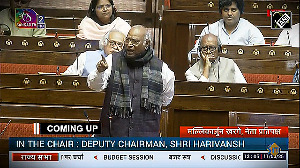In order to keep himself updated, Reserve Bank of India Governor, Yaga Venugopal Reddy woke up at 2 a.m. on Tuesday morning to keep an eye on how the New York Stock Exchange closed.
"I immediately went back to sleep after keeping myself updated," said the governor in his opening remarks to the media on Tuesday afternoon. In a video conference with the media from across the country, Reddy fielded questions from excess liquidity to his outlook on inflation.Excerpts:
On excess liquidity and CRR hike: The rising global inflation is a matter of concern for us. We had to take a view of the domestic economic system. The growth of the economy is basically domestically driven. We thought that there was a need for the withdrawal of accommodation.
In the current juncture, we decided to continue our vigil on the price stability and manage excess liquidity in the system. The CRR is one of the most effective tool to manage liquidity. The CRR cut would take out liquidity worth Rs 16,000 crore from the system. On inflation: Though the inflation has gone off the newspaper headlines . . . it has not gone out of the public's mind.
There is still a fear of high inflation among the people. Hence, inflation expectations have to be well acted. As the economy is getting integrated with the global economy, there are more chances of us getting affected by global uncertainties.
The oil prices are also showing up and we think everything is permanent till proven otherwise. We should also take into account the impact of future excess liquidity. Our efforts are to bring price stability.
On interest outlook: The interest rates will depend on the respective banks depending upon their deposits. We have kept our benchmark rates unchanged. We will get a clearer picture from the banks in the coming days.
On removal of ceiling on daily reverse repo: When we were reviewing the monetary policy framework, we were inclined to go towards a single benchmark. Naturally, given the monetary policy stance, the repo rate would have been an appropriate choice. Then we found that the way market was reacting and the way the liquidity was moving and more importantly the rate of volatility that we anticipated in the money markets . . .
So in such a position, we reviewed the situation. We concluded given the current condition on possibilities, we have to reverse stance. Withdrawal of ceiling on daily reverse repo is not going to be status quo. While removing the ceiling, we have said that it can be reimposed.
On capital account flows: To quote someone, the decisions on capital account management are taken by the ministry and the RBI just announces it.
There is a reasonable amount of consensus among the policy makers globally that capital account also requires to be managed appropriately vis-a-vis the type of openness in the economy existing and reflects flexibility in the capital market, flexibility in the products of commodity market. Capital account management is part of broader government policy and we will announce as and when we have something.
On exchange rate: We need stability, but there are other consequences. There is no target exchange rate. We are just looking at volatility from time to time. Now the exchange rate is determined by market forces. It is not a relevant thing for exporters only.
It impacts exporters, importers, domestic industry and individuals studying in foreign countries. Exchange rate is relevant for all. It has impacts on income, production, profit and expenditure.
On domestic consumption: In any situation, there are always demand wise variations. But it should not be automatically attributed to monetary policy. In terms of aggregate demand, it was required to be moderated. Banks were also advised to better balance their portfolios. Both have been more or less achieved.
On asset price: We don't take a view whether asset prices are right or not. If it rises too fast, we advise banks to be careful. We have taken prudential measures. A trend of moderation has been observed. We may intensify the supervision of some select banks whose asset quality is not up to our expectation.
Action against those who have not moderated loan growth may be contemplated.
Penalty may not be appropriate. It has been our experience that whenever the regulator and the banks discuss issues, normally it brings results.
On banks getting interest on CRR: No interest on CRR is paid. Theoretically, we can have either higher CRR with interest or lower CRR with no interest. At present there is no plan to offer interest on CRR.







 © 2025
© 2025